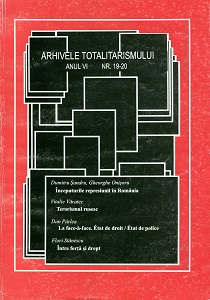Dictionar Biografic
Biographical Dictionary
Author(s): Jipa Rotaru, Alexandru Chiriac, Șerban Pavelescu, Adrian Brișcă, Corneliu BeldimanSubject(s): Military history, Political history, Social history, Recent History (1900 till today), History of Communism
Published by: Institutul National pentru Studiul Totalitarismului
Keywords: biographies; Ion Antonescu; Ion Codreanu; Ion Dumitrache; Victor Lupșa; Nicolae N Moroșan; biographic index;
Summary/Abstract: Ion Antonescu (1882-1946). A career military man during World War I, Ion Antonescu served in many leadership positions, although he was only captain. He became famous in September 1940, when Bessarabia and Transylvania were lost and King Carol II asked him to form a new cabinet. The dethronement, the establishment of the national-iron Guard state, the Iron Guard rebellion of January 1941, the entrance into the war against the Soviet Union (June 22, 1941) on the side of Germany, and the entire domestic policy bore the mark of Ion Antonescu’s authoritarian regime. On August 23, 1944 he was arrested and Romania turned against Germany. In September 1944, he was taken to Moscow with his close aids and in May 1946 he was brought to Bucharest to stand trial. On May 17,1946 he was sentenced to death. He was executed on June 1, 1946 at the Jilava prison. Ion Codreanu (1879-1949) “Old Man Ion Codreanu” was a legendary character, who rose from his status as a farmer to become a symbol of the fight for the rights of Romanians in occupied Bessarabia. He refused to cooperate with the Soviet occupant and in 1940 he was imprisoned by the NKVD in Tiraspol. On May 3, 1941 he was exchanged for Ana Pauker, who was imprisoned in Romania. Ion Dumitrache (1889-1977) Brigadier general Ion Dumitrache participated in the military operations on the eastern front, leading Division 2 Mountain Corps. He participated in the withdrawal from the Caucasus after the Stalingrad disaster and in April 1943 he returned to Romania. After August 23, 1944 he participated in the liberation of north-western Romania. On February 4, 1945 he was relieved of the Mountain Corps command upon an order issued by the Allied Control Commission and he was arrested on charges of war crimes; however, he was released on November 1, 1945 on account of the charge not having been confirmed. Re-arrested on January 8, 1949 on the same charge and released on October 6, 1950 for lack of evidence. He died sidelined on March 6, 1977. Victor Lupșa (1921-1956) Victor Lupșa was one of the heroes of the Romanian resistance; he formed the Vlad the lmpaler II organization. Pursued by the communist authorities, Victor Lupșa ran away into the mountains, acting against communism by writing manifestos and organizing resistance groups; he used the influence of the Army of the Lord, which he was a member of and whose tragic fate later befell on him, too. Nicolae N Moroșan (1902-1944) Nicolae N. Moroșan was a strong personality of the Romanian science, whose life was tied to the destiny of Bessarabia. A great archeologist, the first researcher of the Paleolithic in Moldavia, he discovered very important sites, such as: Ripiceni Izvor, Malul Galben. Arrested by the occupying Soviet authorities of Bessarabia, deported to the USSR, where he was forced to become a member of the Supreme Soviet. Because of his refusal to denigrate his country, he was killed by the NKVD in February 1944, after a talk he had with British diplomat I.H. Le Rougetel, whose testimony has been preserved.
Journal: Arhivele Totalitarismului
- Issue Year: VI/1998
- Issue No: 2-3
- Page Range: 209-232
- Page Count: 24
- Language: Romanian
- Content File-PDF

